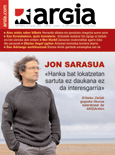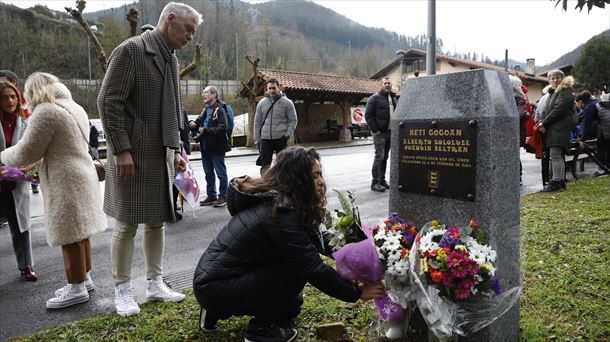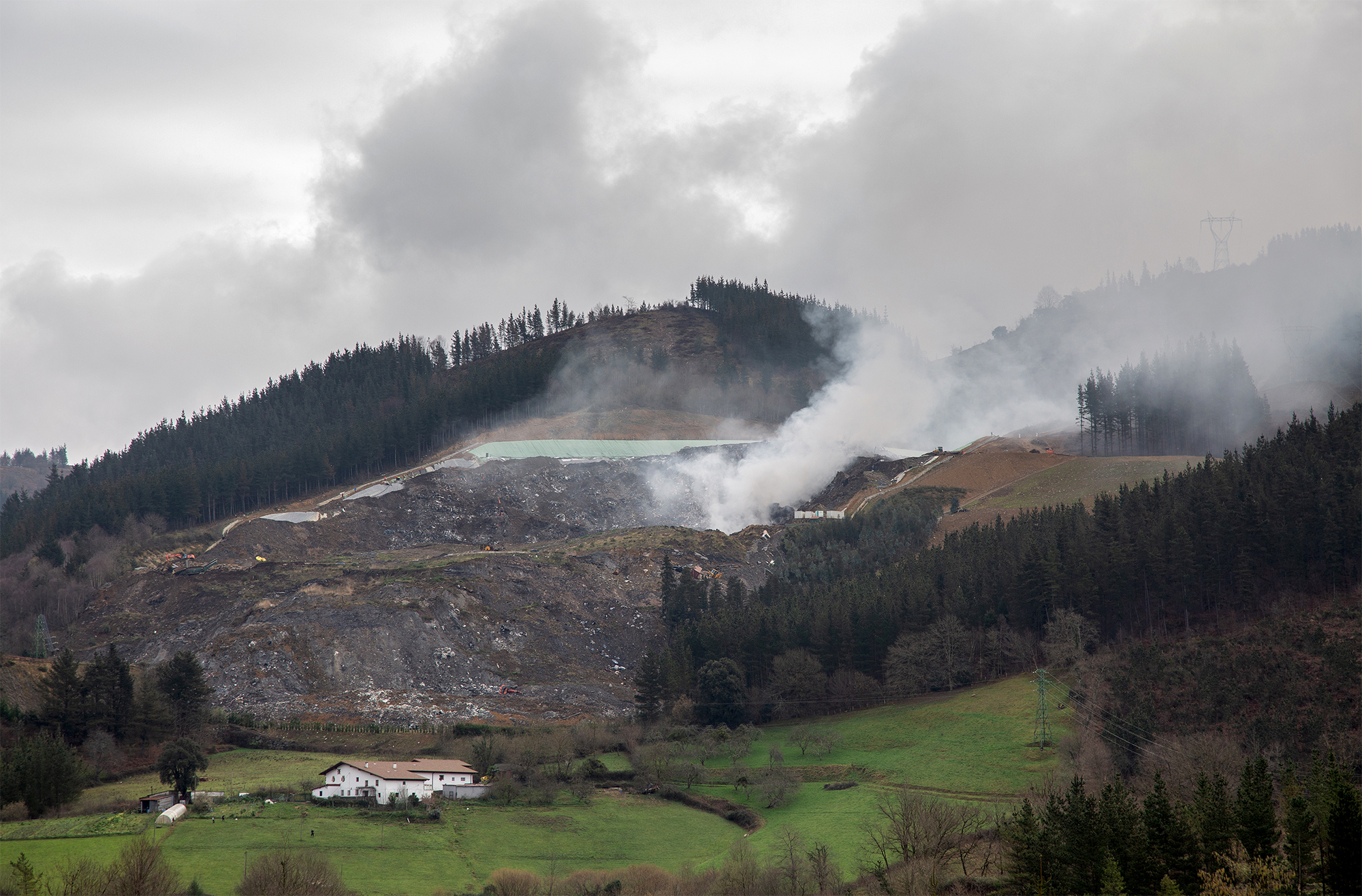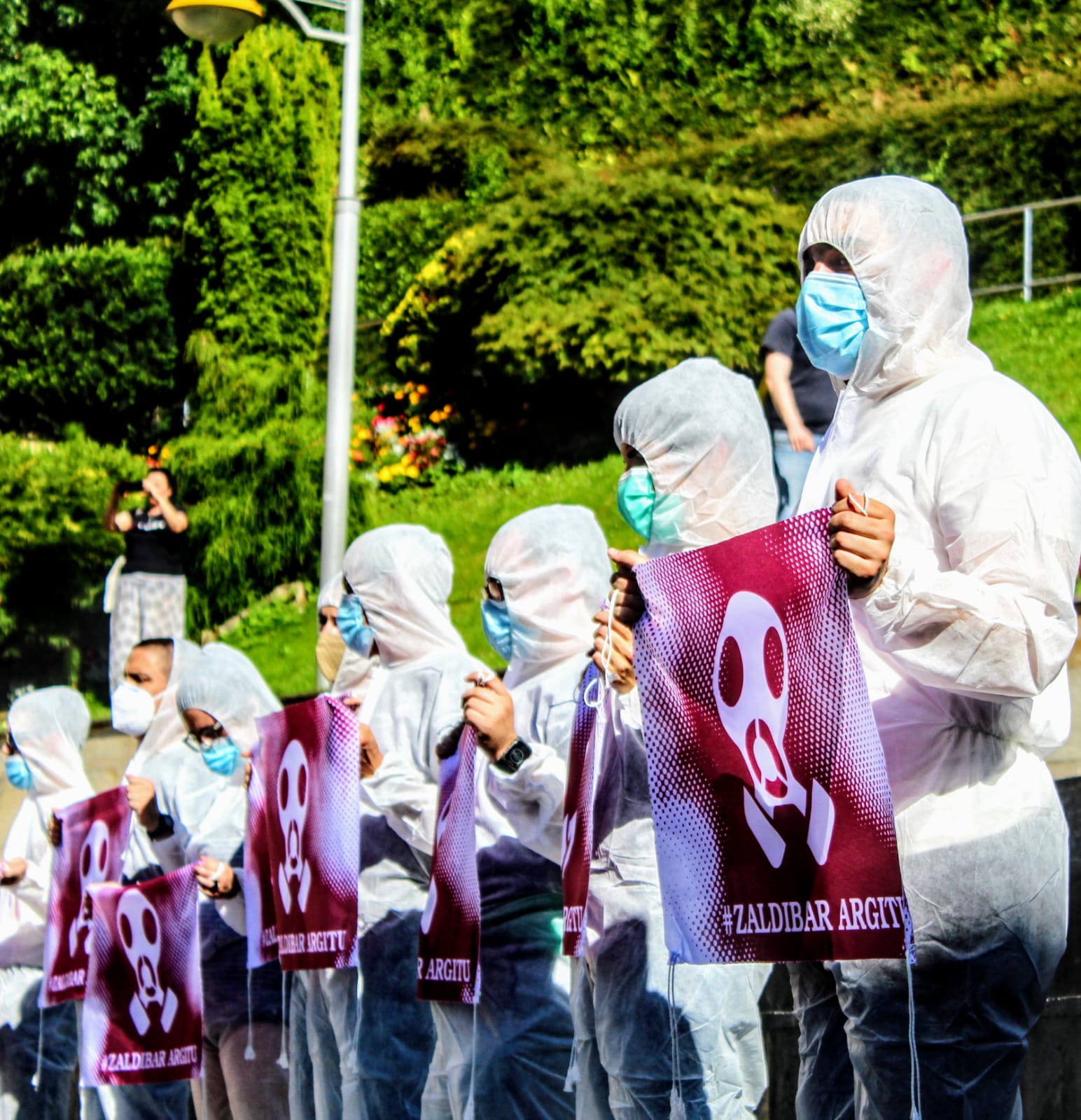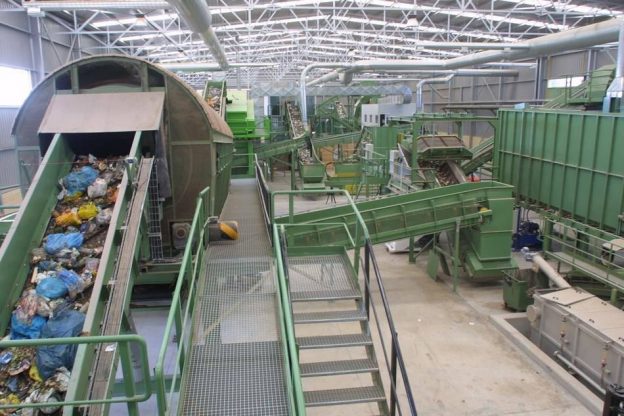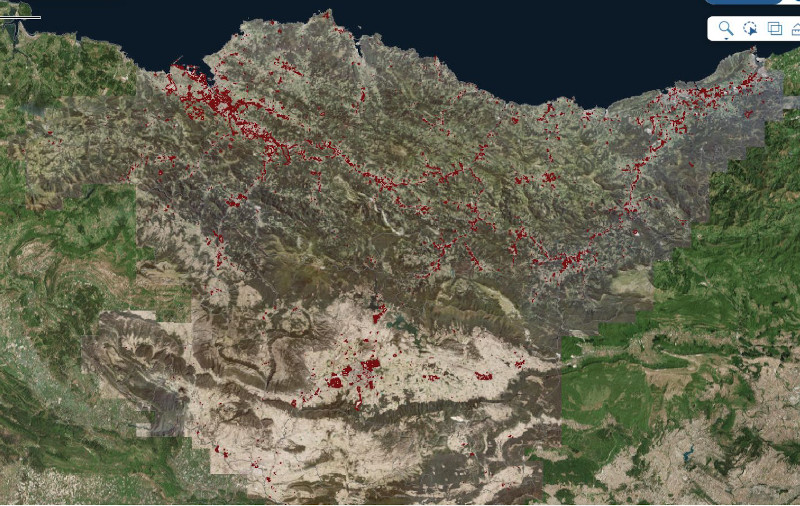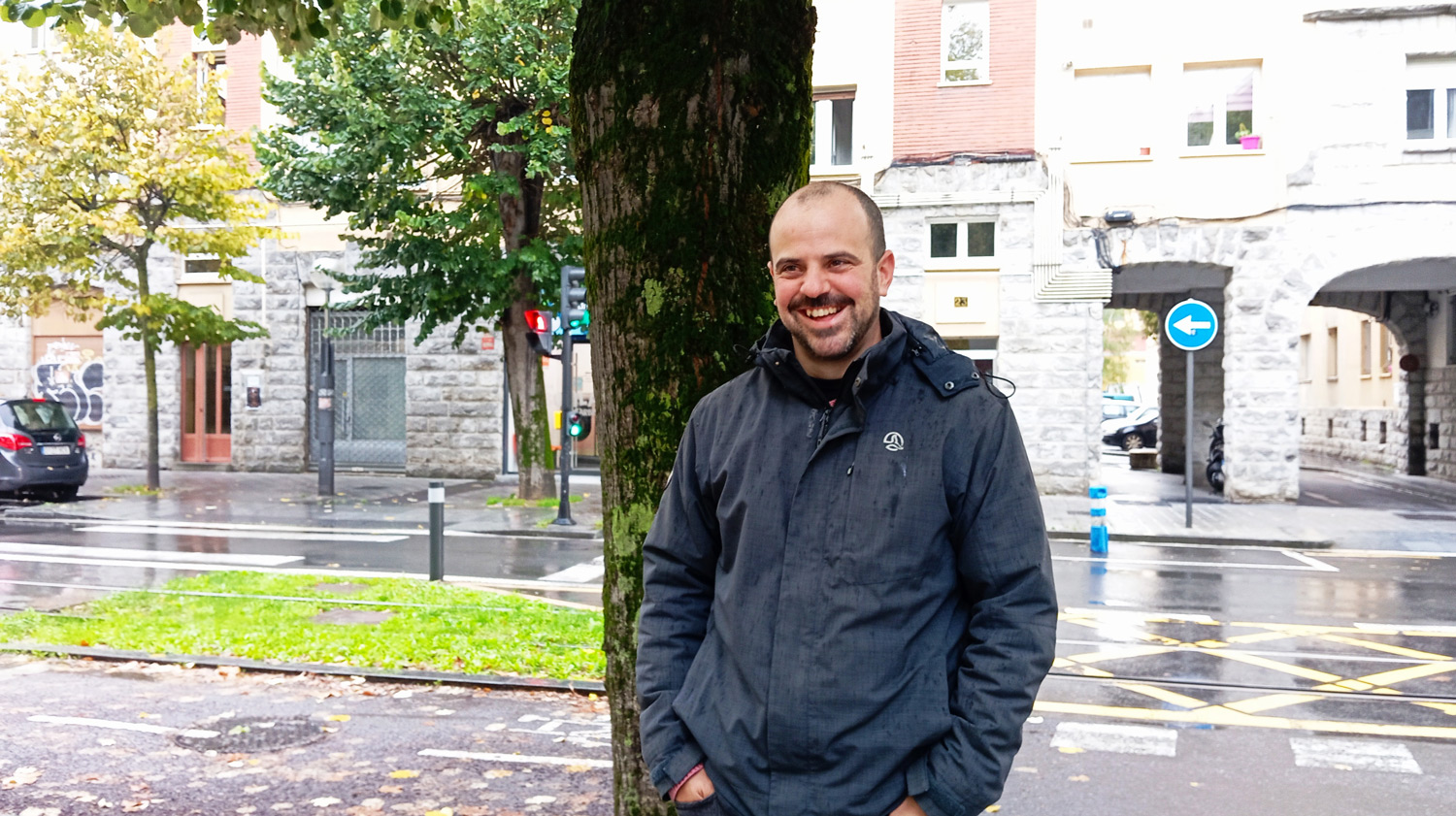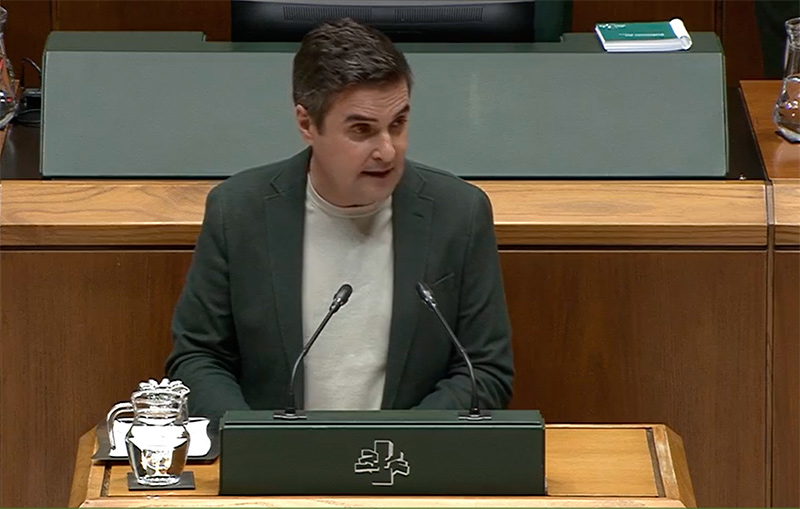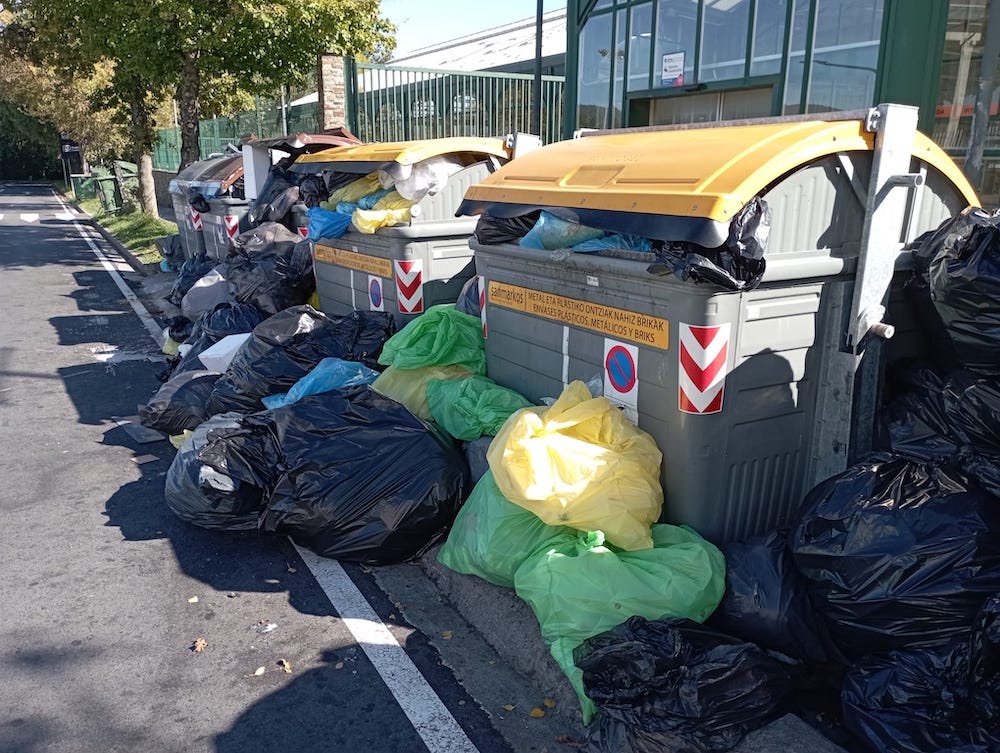Door-to-door collection: alternative versus loss
- On May 9, the collection of waste began door to door in Hernani, with the aim of achieving an 80% recycling rate. Waste is also collected in Usurbil and Oiartzun in this way. Driven by door-to-door and incinerators, the debate on waste in the Basque Country is spreading rapidly. We have confronted the mayor of Hernani, Marian Beitialarrangoitia, and the councilman, Andoni Amonarraiz, so that they can give a practical look at this system.
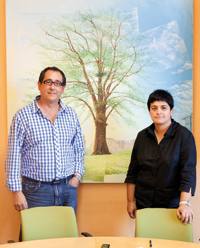
What has been the result of door-to-door collection in Hernani, waste generation and recycling, and how do you rate these results?
Assisted by Marian Beitialarrangoitia: The context must be taken into account. The number of kilos of waste per inhabitant is decreasing, and door-to-door has become operational in this trend. However, the door-to-door sector has managed to increase recycling by 83% in a very short period of time, receiving 115,000 kilos of very good quality organic, which has been accompanied by a significant reduction in the reuse, from 400,000 kilos to 78,000 kilos per month. This is real, the data supports it. Because many times those who oppose this system refer to garbage tourism, but if we take the data of the neighboring towns we can not say that the amount of garbage has increased in them. Besides, we're talking about 300,000 kilos, that's a lot of garbage trucks.
Assisted by Andoni Amonarraiz: I am against this system and I confirm it as the months go by. On the Reus account, I have a surprising doubt: how is it possible that Usurbil, with 6,000 inhabitants, produces 67 tons, while Hernani, with 20,000 inhabitants, produces 69 tons of Reus? And on the other hand, the waste as a whole has gone down in an exaggerated way: From 672 tonnes in June 2009 to 434 tonnes in June 2010. That's not the descent, that's the disappearance of the trash.
What is your hypothesis, Andy?
According to A.A.: The reduction of waste is also in the hands of governments and laws, so that companies can reduce packaging, etc. But no such law has been enacted, and the production system remains the same, a citizen who previously bought fillets wrapped in containers, even now does so. I believe that Hernani continues to produce the same amount of waste, and if it has fallen by 45.4%, that amount is either on the street or has gone to other towns. On the other hand, Marian says that the quality of the organic is very good. As I have read in the press, the Consorcio de Residuos de Guipúzcoa (Waste Consortium of Guipúzcoa) has given notice to the San Marcos community because the organic that arrives in Lapacha is of poor quality.The M.B. : I'm not worth the newspaper articles, but the official papers. The consortium states in its final characterization that the quality is 98.4%. Imagine the good data provided by the Consortium, when we know that it is putting as many obstacles as possible to the door to door, when the characterizations are being carried out without us being present, and when they are being carried out the day after their arrival in Lapacha, with the possible loss that this may entail. And yet, the Consortium has provided this data.
What the door-to-door does is that you take care of your own waste and one of the reasons for the waste reduction is that guilds can no longer camouflage your trash into urban waste containers. And you’ve talked about laws: the first law says that we have to collect all the organic separately, today only the door-to-door makes this possible.
According to A.A.: And the fifth container.
The M.B. : The fifth container does not allow this because it is voluntary, not mandatory.
According to A.A.: But according to the data I have, not everything is collected with the door to door, 366.00 kilos have disappeared and part of it is organic.
The M.B. : Their disappearance must be proven, and if not, they have not been created.
People who are self-employed are now many more.
The M.B. : They have gone from more than a hundred to almost seven hundred. As a result of the controversy that has arisen, the citizen is more aware that his action could be important to get the organic out of the circuit.
According to A.A.: The door to door has done a lot of talking about ruins in Hernani. People have seen the need to tighten the screw more with what goes to the green container, and the dilemma of the two collection systems has arisen: door to door or the fifth container. It is true that the number of Hernanians who have decided to self-compose has increased, there is always an initial step, we will see if it stays at that level, it will be beautiful if it stays.
In terms of health and the environment, what impact can waste management have? Door-to-door has been established to be an alternative to cremation...
The M.B. : Door-to-door puts health above everything else. The future must go through the generation of less waste to go to the depth of zero waste slogans. Nobody wants polluting incinerators next door; you can put a thousand reports on the table, but they are still one of the main emitters of dioxins and furans. And I am not willing to leave the health of the Hernanians in the hands of an incinerating lobby that seeks to do business. The door-to-door, despite its many achievements, leaves a part that cannot be recycled, but also the incinerator. The difference is that the door to door reuse is inert and the incinerator, on the other hand, needs a polluting landfill to collect the ashes and squirrels. If the door to door were implemented in the whole of Gipuzkoa, the incinerator wouldn’t have anywhere to eat, that’s why those who support the incinerator are betting on the fifth container, which at best provides a recycling rate of 35%. Hernani receives in a single day the same amount of organic received in a month by populations that are larger than him. And on the other hand, the street food containers are a place of harm to smell and health, because the schedules are not respected.According to A.A.: It is unhealthy for me to put the waste in the freezer for several days, or for the workers to pick up the waste manually. In addition, a transfer site has been set up and local leachates have been channelled through the rain-collection pipeline, photos are available. I think it’s illegal and the government doesn’t know about it.
And in the incinerator’s line: I don’t know, for today, any system other than cremation to end the reuse. Not only do we say that, in France, in Germany, in Japan, in Norway...also. It is also not true that it is the most polluting element; incinerators have been the main target of environmentalists and have therefore applied the most restrictive laws to CO2 emissions, requiring them to emit ten times less than cement factories. I don’t say that they don’t spill, but I do say that cars also spill, and that’s why we don’t stop riding in the car.
The M.B. : We can all put up lists of peoples. I can mention a town that has installed a zero-waste program before the second incinerator is installed, starting with San Francisco. It is not enough to set examples, it is enough, if we have a non-polluting alternative, to resort to it.
Is this garbage collection economically sustainable?
According to A.A.: I think it's a disaster. The maintenance of the previous system and the establishment of the fifth container would cost EUR 1,660,000 per year. Between the start of the door-to-door operation and the 13th of September, which is the data of the City Council’s auditor, 1,354,000 euros have been spent. The extra hours of staff and the costs of using vehicles have not been accounted for; the costs of treating organic matter are missing; the contribution to San Marco has not been calculated... And yet there's 300,000 kilos of trash missing that we don't know where they are.
The M.B. : There are some investment expenses added when a system is established, which must be amortized over a period of time. The feasibility of the door-to-door system is not measured by the fact that it spends less or more on the implementation of the system, but by the usual annual expenses that it has once the system is consolidated. Hernani is not at this stage. I have always argued that door-to-door is the same as the other system in terms of expenditure, but I would continue to support it even if it were more expensive, because I think health is priceless.
However, here there are two types of expenses: the one generated by the collection and the one generated by the treatment. The door-to-door has more expense in the collection, of course, it is not the same to collect 7,000 hangers or 50 containers, but it creates more jobs. As far as treatment is concerned, the most expensive part is the reuse, which has nothing to do with what we paid before. On the other hand, how is it understood that any private company can compost a ton of organic matter for 60 euros and that the Provincial Council, on the other hand, charges 100 euros? Unfortunately, the issue has become politicized and there is an underlying lack of interest in lowering prices, as the benefits of the door-to-door approach would become more evident. The City Council of Hernani has managed to increase revenue from the recycling of packaging, paper and glass. In Catalonia there is only one people who have eliminated the door to door – by a political decision – and we all know how the Catalans control the pela. It is true that the initial calculations were not fully adapted, but it is a new system and I am proud to be the first.
According to A.A.: On the one hand, the San Marcos Community is paying this price for composting the organic because it has not signed this agreement [in its hands] with the Consortium. That's 25% cheaper, and we didn't sign it. On the other hand, it now seems that the value of the door-to-door is to create jobs. Well, another way to create jobs is to remove the computers and write them by hand. I would like to know how much mechanical and human resources it would take if all the Hernanians left the garbage piled up in the street to collect everything at the indicated time. But if the door-to-door system proposed at the beginning is not met, while another door-to-door system with extended collection times is implemented, the cost is different.
The M.B. : The system hasn't changed. Another thing is that the calculation is not fully adapted. There are villages that have taken the whole year to optimize the collection time. In any case, I would like to clarify this 25% issue. First, it's not true. The consortium, which did not charge 25% cheaper in the initial months, is now charging cheaper because it knows what it was doing was illegal. And secondly, San Marco didn’t sign the agreement, not because he didn’t want the organic composting to be 25% cheaper, but because he tied his hands and the Consortium went on to have all the control, which seems like a monopoly.
And how does this management affect the population’s waste rate?
The M.B. : We have said that even if the citizen pays a high rate of garbage, he has no right to pollute. Until now, part of the garbage rate has been paid by the administration; it would be difficult to lower this rate to the citizen in the short term, because first we should be able to reduce the part that the City Council pays. On the other hand, today there are different rates: those who do self-compost, or who have to take the waste to the collection point in the rural areas, pay less because they make more effort.
According to A.A.: It would be ideal if citizens could pay for all the services offered by the City Council. But I don’t think we’ll ever get there, treating rejection is expensive, people would be surprised if they knew the cost.
The M.B. : You said that treating rheus is expensive. It will be even more expensive with the incinerator system...
According to A.A.: It’s better to spend money with this treatment system than to go back to landfill. When we were in Barcelona, the rejón was called “almost inert” and they thought to gather in quarries making packs... We made the cross, that has to be treated.
The M.B. : If we take away most of the organic and really put R&D&I resources to make diapers self-compostable, won’t you tell me that we can’t go from 20% rejection to 10%? I'm not making it up, they're doing it in the world. It could inertize and gather in much smaller places.
According to A.A.: You talk to me about the future. We all agree that the reuse should be as small as possible, and I propose awareness and a fifth container for this. I am talking about making life easier for the citizens who live here and now, and not about harming them at the expense of possible future health problems. We have to use the present means and improve them until we reach the ideal, but in the meantime we can’t be hibernating, we have to live.
How has the door to door changed the daily life of the Hernanians?
The M.B. : It’s a small change of habit, but it’s so small that people have adapted right away. In the face of the crisis, the public realises that it is not that complicated. People on the street have told me that it's easier, that it's closer to the elderly... There will be those who do not want to do things well, but those who oppose the door to door cannot promote it. This means that the rules that are established for the people, according to their own taste, can be respected or not.
According to A.A.: I believe that a large part of the population is committing civil disobedience and that they are very distressed. You know one reality and I know another. Having to keep garbage at home for longer than you want...
The M.B. : In my house it’s not like that: I have three days for organic, two for plastic... I take the reuse once a month because I don’t have the obsession to take out of the house what I have created.
According to A.A.: If I have dirty hands, I wash them. And I try to keep the dirt as close to me as possible.
The City Hall of Donostia-San Sebastián announced at last Thursday’s plenary session that it will increase the waste rate by 26.5% from January 2025, claiming that Waste Law 7/2022 obliges this. Eguzki, for its part, has denounced that the law only applies in terms of costs,... [+]
August is the holiday month for many people, including those who rule. And yet it is common to take advantage of the month of August to deal with some issues without much noise, albeit of great importance.
This is what is happening with the project to centralize sludge... [+]









